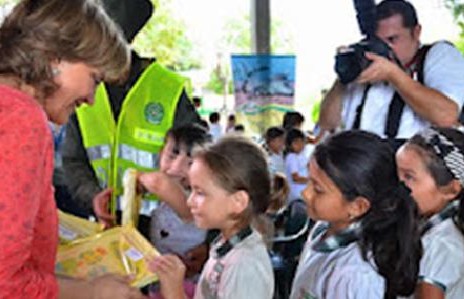
“Todos a Aprender”: Colombia Puts Learning at the Center of its Education Policy
What Columbia is doing to improve its education quality.
This post is also available in: Spanish
Last month we conducted a regional survey on what Latin Americans interested in educational issues thought should be the new indicators to monitor progress in the education sector, especially in the context of the post-2015 Development Agenda (view the survey results here).
Latin America has met the Millennium Development Goals, almost universalizing primary education and achieving gender equity in terms of coverage. At the same time, the region has been producing more information on learning indicators (both from national measurement systems and international comparative systems such as the Program for International Student Assessment, PISA, or the Latin American Laboratory for Assessment of the Quality of Education, LLECE), and the results are troubling. What you find is that students are not learning.
We received survey responses from various countries, especially Argentina, Chile, Colombia, Dominican Republic, Mexico, and Nicaragua; but also from Brazil, Guatemala, and Paraguay. Only a few from Costa Rica, Cuba, Panama, Uruguay, and Venezuela. At any rate, these responses from teachers, academics, citizens interested in the issue, officials, students, employers, and even politicians, indicate that the absolute majority feels the new indicators should focus on learning. This seems to be the consensus in most of the audiences (i.e. technical forums, expert consultations, etc.) who have touched on the issue of post-2015 indicators.
Latin Americans believe we should measure results that capture progress in early development; and also reading ability, from the early years (the 2nd grade), to the end of primary, and at age 15 when the majority study in high school and are getting ready to consider entering the labor market.
As for early development indicators, there is support for measuring both cognitive and socio-emotional development. Few, only 13 percent of respondents, do not consider monitoring these results important. Ironically, the development of human capital is particularly important at this age since that is when the brain develops and the minimum skills needed to progress to the next educational levels are strengthened.
At the end of 2nd grade students are expected to have reached reading automaticity, and can not only learn to read effectively, but learn how to learn. In principle, most achieve this level at the end of second grade when their reading abilities have developed so that youth do not need their memory (working memory) to read, and can use that memory to interpret, understand and for creative thinking. A standard that has been used to measure early reading is the ability of reading fluency (60 words per minute for students who complete second grade) because it is highly correlated with comprehension.[i] Most survey respondents, 88%, believe that this indicator should be used.
We proposed the use of the OREALC/UNESCO test to monitor reading ability in the primary level. This test has been performed three times in the last 12 years, and has acquired a strong credibility. A majority of respondents, 97%, thought the test should be used. The same proportion of respondents believed PISA should be used to monitor the quality of education at age 15. This is good news because the test would also serve to make comparisons with our competitors in the global economy.
Equally consistent were the responses to questions we asked around how to move in the direction of improving learning indicators. 96% of respondents indicated support for the idea that the state has an obligation to provide the necessary means to allow all children to achieve the proposed targets. Similarly, 96% of respondents supported the proposal to demand that all presidential candidates take a clear position on learning goals.
We believe that these last two answers are of great importance. Experts can debate goals all they want, but if the discussion does not receive a strong political presence, it is unlikely that we will see real progress. We must establish responsibilities and demand definitions and commitment from our leaders.
To contribute to this debate, we intend to ask the following questions to all presidential candidates in Latin America and publish the answers on this blog (including lack of responses when appropriate):
We will begin with presidential candidates in Bolivia, Brazil, Colombia and Uruguay during 2014, and will continue with Argentina and Guatemala in 2015.
[i] Kudo, Ines, and Jorge Bazan. 2009 “Measuring Beginner Reading Skills. An empirical evaluation of alternative instruments and the potential use for policymaking an accountability,” PDWB 4812, The World Bank: Washington DC.
What Columbia is doing to improve its education quality.
Does the Obama administration’s Race to the Top program measure up?
Interview discusses Latin America and its recognition of the role of education in the economy and democratic governance.